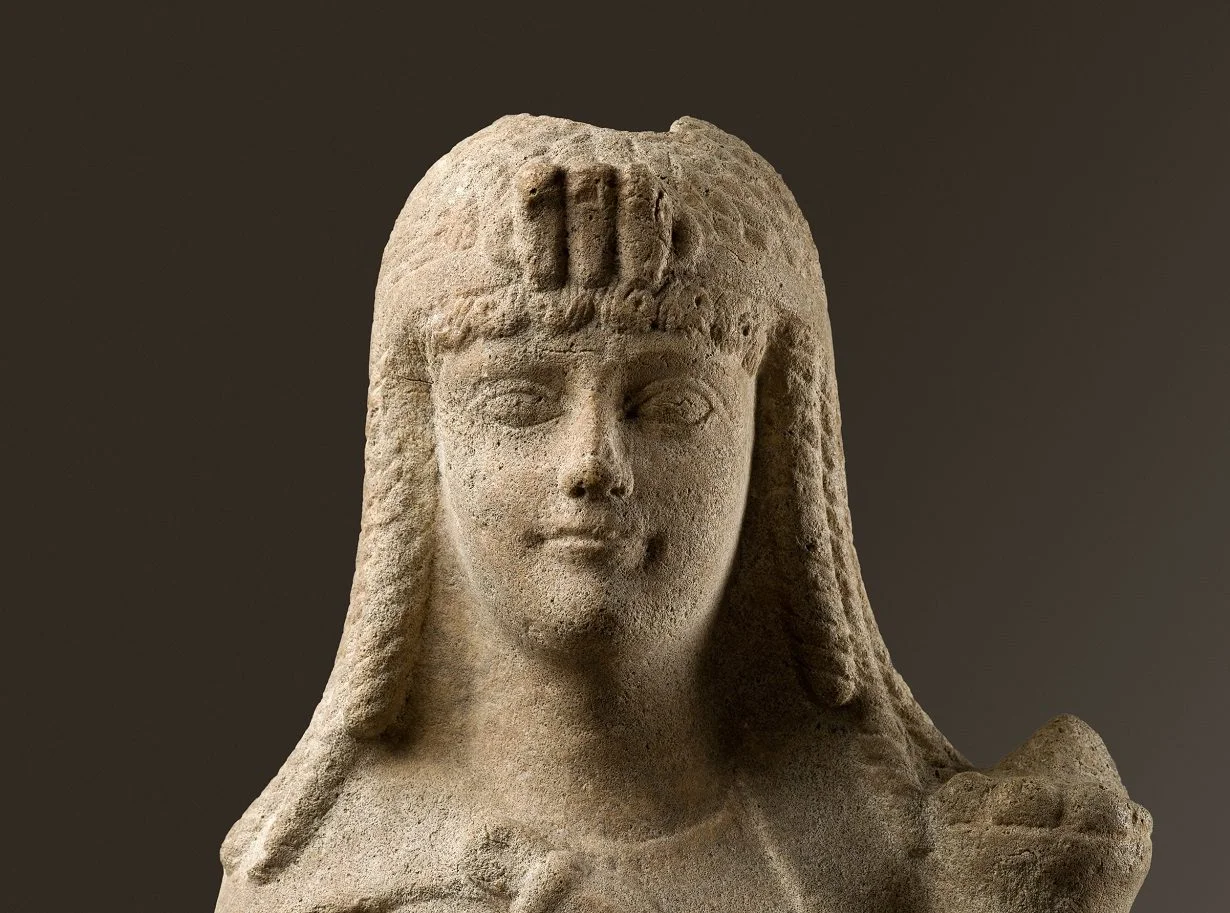Cleopatra VII Philopator, most commonly known as Cleopatra, was queen of the Ptolemaic Kingdom of Egypt and the last ruler before the country was annexed by the late Roman Republic.
Cleopatra was born in 69 BC to pharaoh Ptolemy XII Auletes and possibly Cleopatra V, although contemporary records suggest that Cleopatra V was exiled shortly after Cleopatra’s birth.
Her childhood tutor was Philostratus the Egyptian, a sophist philosopher and orator of Ancient Greek arts. She continued her studies at the Mouseion in Alexandria (which included the famous Library of Alexandria), where she was educated by the leading scholars of the Hellenistic world.
Cleopatra’s father was a client ruler to the Roman Republic, declared by the First Triumvirate (an alliance between Pompey Magnus, Caesar and Crassus) as a “friend and ally of the Roman people”, after Ptolemy XII paid tributes and bribes to maintain his rule, almost bankrupting the royal treasury of Egypt.
However, when the Romans annexed Cyprus after accusing Ptolemy XII’s brother (King Ptolemy of Cyprus) of aiding pirates, Ptolemy XII remained silent to the events, resulting in an uprising that exiled him and possibly Cleopatra from Egypt.
The throne was claimed by Cleopatra’s older sister, Berenice IV, who ruled jointly with Cleopatra VI. Ptolemy XII travelled to Rome to seek support, failing to secure a military intervention. Eventually his patron, the triumvir Pompey, persuaded the Roman governor of Syria, Aulus Gabinius, to invade Egypt and restore him as Pharaoh.
In the final years of his reign, Ptolemy XII designated that Ptolemy XIII would be married to his older sister Cleopatra, acting as regent until Ptolemy XIII would be of age to rule Egypt together.
In 51 BC, contemporary documents started listing Cleopatra as sole ruler and her face began appearing on minted coins, suggesting that she had rejected her brother to maintain sole authority of the crown. Despite this, Ptolemy XIII’s guardians, namely the eunuch Pothinus, Achillas, and Theodotus of Chios supporting the young pharaoh and attempted to depose Cleopatra.
Cleopatra was then forced to flee Alexandria and withdraw to Roman Syria with her younger sister, Arsinoe IV, to gather an invasion force. She returned to Egypt with an army but her advance was blocked, forcing her to camp outside Pelousion in the eastern Nile Delta.
During the same period, Julius Caesar was engaged against the forces of Pompey Magnus, with the latter loosing at the decisive Battle of Pharsalus, leading to the destruction of Pompey’s army.
Pompey planned to use his close relationship with the Ptolemies to replenish his forces and travelled to Egypt after being invited in a scheme devised by Theodotus, resulting in Pompey being ambushed and stabbed to death in 48 BC.
Ptolemy XIII’s advisers had feared the idea of Pompey using Egypt as his base in a protracted Roman civil war, believing that by sending Pompey’s severed and embalmed head to Caesar would defuse the situation and ensure favour with the Romans.
However, Caesar expressed grief and outrage over the killing of Pompey and called on both Ptolemy XIII and Cleopatra to disband their forces and reconcile with each other. In defiance, Ptolemy XIII arrived at Alexandria at the head of his army, whilst Cleopatra met with Caesar personally, in which Cassius Dio records that she did so without informing her brother, dressed in an attractive manner, and charmed Caesar with her wit.
Caesar then brought Cleopatra and Ptolemy XIII before the assembly of Alexandria, where Caesar read the will of Ptolemy XII that named Cleopatra and Ptolemy XIII as joint heirs. In an attempt to remove the rivalry to the Egyptian throne, Caesar then tried to position the siblings, Arsinoe IV and Ptolemy XIV, to rule together over Cyprus.
Caesar’s reinforcements arrived in 47 BC and attacked Ptolemy XIII’s army, forcing them to withdraw to the Nile in which Ptolemy XIII drowned when his boat capsized.
Cleopatra was absent from these events and resided in the palace in Alexandria, where she gave birth to Caesar’s alleged child Caesarian. Caesar appointed Ptolemy XIV as a joint ruler with Cleopatra in a nominal sibling marriage, leaving several legions to secure Cleopatra’s tenuous position and maintain order in Egypt.
Ptolemy XIV is considered to have reigned in name only, with Cleopatra keeping actual authority. Although uncertain, it is assumed that Cleopatra had Ptolemy XIV poisoned with aconite following Caesar’s assassination, replacing him with her son Ptolemy XV Caesar (Caesarian) as her co-ruler in 44 BC. Read the fall of Mark Anthony and Cleopatra
Header Image – Ptolemaic status believed to be of Cleopatra VII – Image Credit : Public Domain
